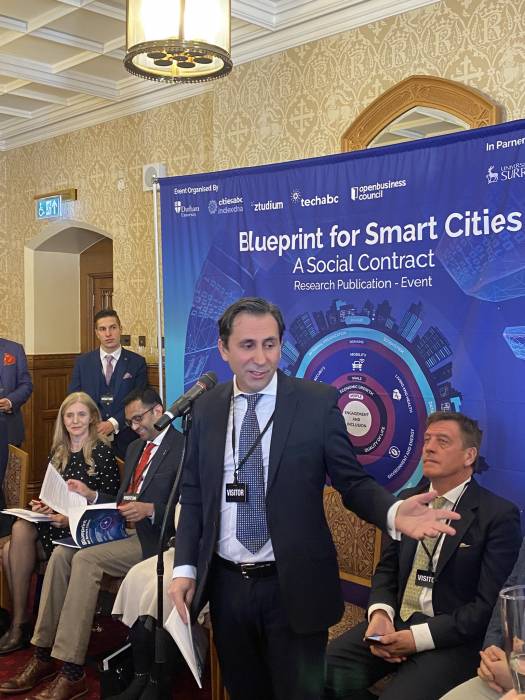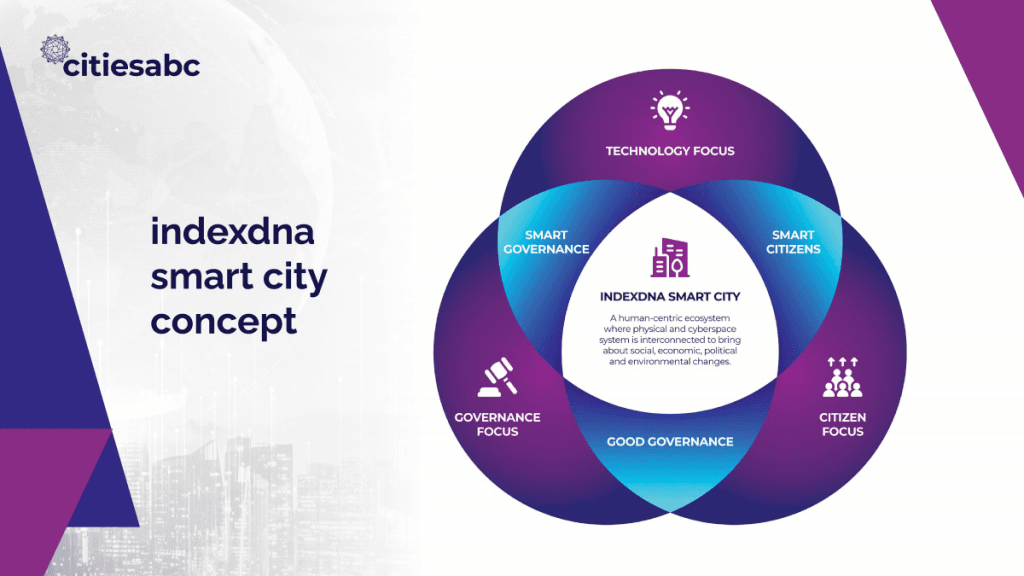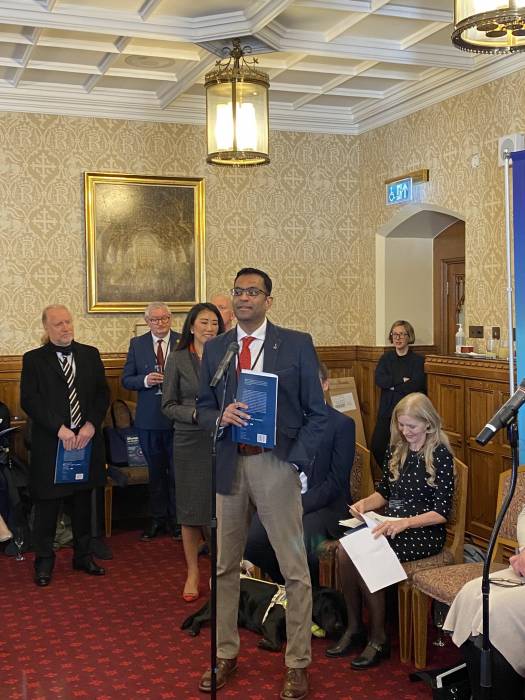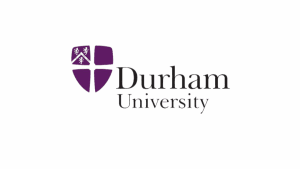business resources
Blueprint for Smart Cities : A Social Contract, A Research Publication by University of Durham and citiesabc
8 Sept 2022, 6:33 am GMT+1
The “Blueprint for Smart Cities” lays out the foundation of a new social contract based on inclusivity, safety, resilience and sustainability in the cities of the future. The research was led by citiesabc indexdna and the University of Durham, in partnership with University of Surrey, Big Innovation Centre and World Smart Cities Forum.
As cities continue to grow in both size and population, redefining human interaction along the way, a framework for human-centric smart city ecosystems has become critical. The urban population is expected to grow by around 7 billion by 2050 and, while this brings immense opportunities, it also creates huge challenges. In such a scenario, the need of the hour is to create inclusive, safe, resilient, and sustainable cities. Cities need to become smarter, bring all stakeholders together, and utilise the latest technological innovation. Previous models for smart cities have suffered challenges, owing to the shifting dynamics of physical and cyberspaces.
The “Blueprint for Smart Cities” redesigns the current model to provide a new social contract with humans at the core. It focuses on extensive coordination between policymakers, universities, industry, and citizens: the four agents that make up the Quadruple Helix Innovation model on which the analysis has been based. The multilateral feedback systems that exist between these agents are crucial to consider if we are to meet the UN’s Sustainable Development Goals (SDGs). The Blueprint for Smart Cities is an approach based on the intersection of human and technological aspects of development.
“A smart city does not simply mean 'smart + city', but emphasises who is leading the city. This means developing a city by the people, for the people, where the goal is to create a human-centric ecosystem. ‘Blueprint for Smart Cities – A Social Contract’ with citiesabc indexdna provides a way of developing a human-centric ecosystem where physical and cyberspace systems are interconnected to bring about social, economic, political and environmental changes”, explains Her Royal Highness, Princess Katarina de Silva of Yugoslavia and Serbia.

Citiesabc CEO Dinis Guarda presents his vision of a smart city with the people at its heart.
Compiled by citiesabc indexdna and the University of Durham in partnership with University of Surrey, Big Innovation Centreand World Smart Cities Forum and led by Professor Kiran Fernandes and Dr. Atanu Chaurhuri, the Blueprint for Smart Cities advocates a human-focused approach to building smart cities of the future. The blueprint highlights the dynamics that exist in cities globally between the four agents at the outset of the Quadruple Helix Innovation model. It explores the multidirectional feedback systems that emanate from their respective decisions and understands the complexity of these constant adjustments and adaptations, proposing a framework for the holistic development of cities.
“We realised that smart city indexes operated within a static framework, making the results unreliable and in constant need of updates. Our approach is dynamic, identifying smart cities as human-centric and analysing the multidirectional feedback systems between the different pillars that make up a smart city. We are thrilled to have collaborated with the Centre for Innovation and Technology Management at the Durham University Business School, whose academic insights and deep research were crucial to creating this Blueprint for Smart Cities. In doing this, we hope to set a new standard for future smart city indexes and rankings”, said Dinis Guarda, founder Citiesabc & OpenbusinessCouncil, author.
 indexdna smart city concept
indexdna smart city concept
The report identifies a number of factors for consideration that are outlined as essential to the development of a human-centric smart city alongside technological advancements: 1. Innovation & Technology, 2. People & Human Resources, 3. Wellness, Health, Education & Liveability, 4. Financial Funding, 5. Leadership & Governance, 6. Business Professional ESR, 7. Circular Economy, and 8. Energy Net Neutrality. According to Dr. Kiran Fernandes Professor at Durham University and co-author of the report, this blueprint serves as a “handbook for developing human-centric cities. The report is in direct sync with the UN's Sustainable Development Goals and specifically promotes sustainable, inclusive and resilient economic growth. It ensures productive and decent employment for all. We aim to make our cities and human settlements inclusive, safe, resilient and sustainable on a global scale”.
“Blueprint For Smart Cities” is an initiative in continuation of the governments’ constant efforts for building smarter and more digitised cities worldwide. It is an enhancement of the global efforts to create sustainable, more habitable smart cities, and ready for the future.
Download the report here

Professor Kiran Fernandes addresses a distinguished audience, presenting the Executive Summary & Key Findings from the Smart Cities Blueprint.
About citiesabc indexdna

Citiesabc indexdna is the data analysis platform powering the dashboards for citiesabc. It is a digital transformation platform to empower, guide and index cities. citiesabc was formed by a team of global industry leaders, academics and experts creating new solutions, lists, rankings and connections for the world's top cities and populations. citiesabc offers the best of innovation in 4ir, digital transformation, blockchain, AI, NFTs, smart cities technologies and big data. Along with Durham University and strategic partners, citiesabc indexdna has produced the research “Blueprint for Smart Cities: A Social Contract” which highlights the dynamics that exist in cities globally between the four agents at the outset of the Quadruple Helix Innovation model and propose a framework for the holistic development of cities.
About Durham University

Durhamis an international triple-accredited business school. Founded in 1965, we are one of the UK's longest established business schools and are proud to be integral to Durham University. Sharing insights, supporting innovation and teaching tomorrow’s leaders. We believe that to succeed in business, you need to get closer to the realities of business - so that’s what we do. We combine our academic excellence, insightful research and exceptional global business connections, to equip our students and alumni to become innovative business thinkers of the future and influential individuals in and beyond their careers. A globally outstanding centre of teaching and research excellence, a collegiate community of extraordinary people, and a unique and historic setting – Durham is a university like no other.
Share this
Contributor
Staff
The team of expert contributors at Businessabc brings together a diverse range of insights and knowledge from various industries, including 4IR technologies like Artificial Intelligence, Digital Twin, Spatial Computing, Smart Cities, and from various aspects of businesses like policy, governance, cybersecurity, and innovation. Committed to delivering high-quality content, our contributors provide in-depth analysis, thought leadership, and the latest trends to keep our readers informed and ahead of the curve. Whether it's business strategy, technology, or market trends, the Businessabc Contributor team is dedicated to offering valuable perspectives that empower professionals and entrepreneurs alike.
previous
Five Tips to Improve Your Private Events Bookings: A Guide for Busy Restaurants
next
Unique Ways to Use Video to Boost Your Social Media Efforts